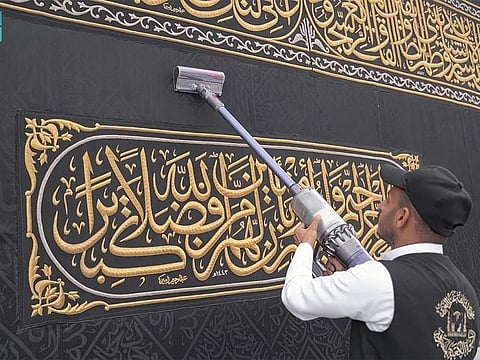Photos: How the holy Kaaba Kiswa in Mecca is taken care of
The cloth cover of the revered site is daily checked and upkept

Cairo: Advanced techniques and high-quality materials are employed to upkeep the Kiswa or the black cloth covering the Holy Kaaba, housed in Islam’s most sacred site in Mecca, Saudi Arabia.
The Kiswa of the cube-shaped structure, which Muslims around the globe direct in their prayers, is checked daily and the focus of regular maintenance undertaken by a Saudi team including experts with a 29-year experience, according to a state agency in charge of the Grand Mosque in Mecca and the Prophet’s Mosque in Medina, Islam’s two holiest places.
The General Authority for Care of the Two Holy Mosques pointed out that the team checked all parts of the kiswa and its fixing rings.
In case of any observations, they are handled immediately in line with the highest standards of precision and top-notch performance in a record time, the Saudi news agency SPA reported.
Regular upkeep also includes all-out cleaning and tightening the cloth covering from all sides.
Millions of Muslims flock to Saudi Arabia to perform annual Hajj pilgrimage and Umrah or lesser pilgrimage.
Saudi Arabia expects around 10 million Muslims from abroad during the current Umrah season.
The season began more than five months ago after the end of Hajj and around 1.8 million Muslims attended for the first time in three years after pandemic-related restrictions were lifted.
Muslims, who cannot physically or financially afford Hajj, go to Saudi Arabia to do Umrah.
In recent months, the kingdom has unveiled a host of facilities for overseas Muslims to come to the country to perform Umrah.
Muslims holding different types of entry visas such as personal, visit and tourist visas are allowed to undertake Umrah and visit Al Rawda Al Sharifa, where the tomb of the Prophet Mohammed (peace be upon him) is located at the Prophet’s Mosque after booking an e-appointment.
Saudi authorities have extended the Umrah visa from 30 days to 90 and allowed holders to enter the kingdom via all land, air and sea outlets and leave from any airport. Women pilgrims are no longer required to be escorted by male guardians.
The kingdom has also said that expatriates residing in the Gulf Cooperation Council countries are eligible to apply for a tourist visa, regardless of their profession, and be able to perform Umrah.
Sign up for the Daily Briefing
Get the latest news and updates straight to your inbox



